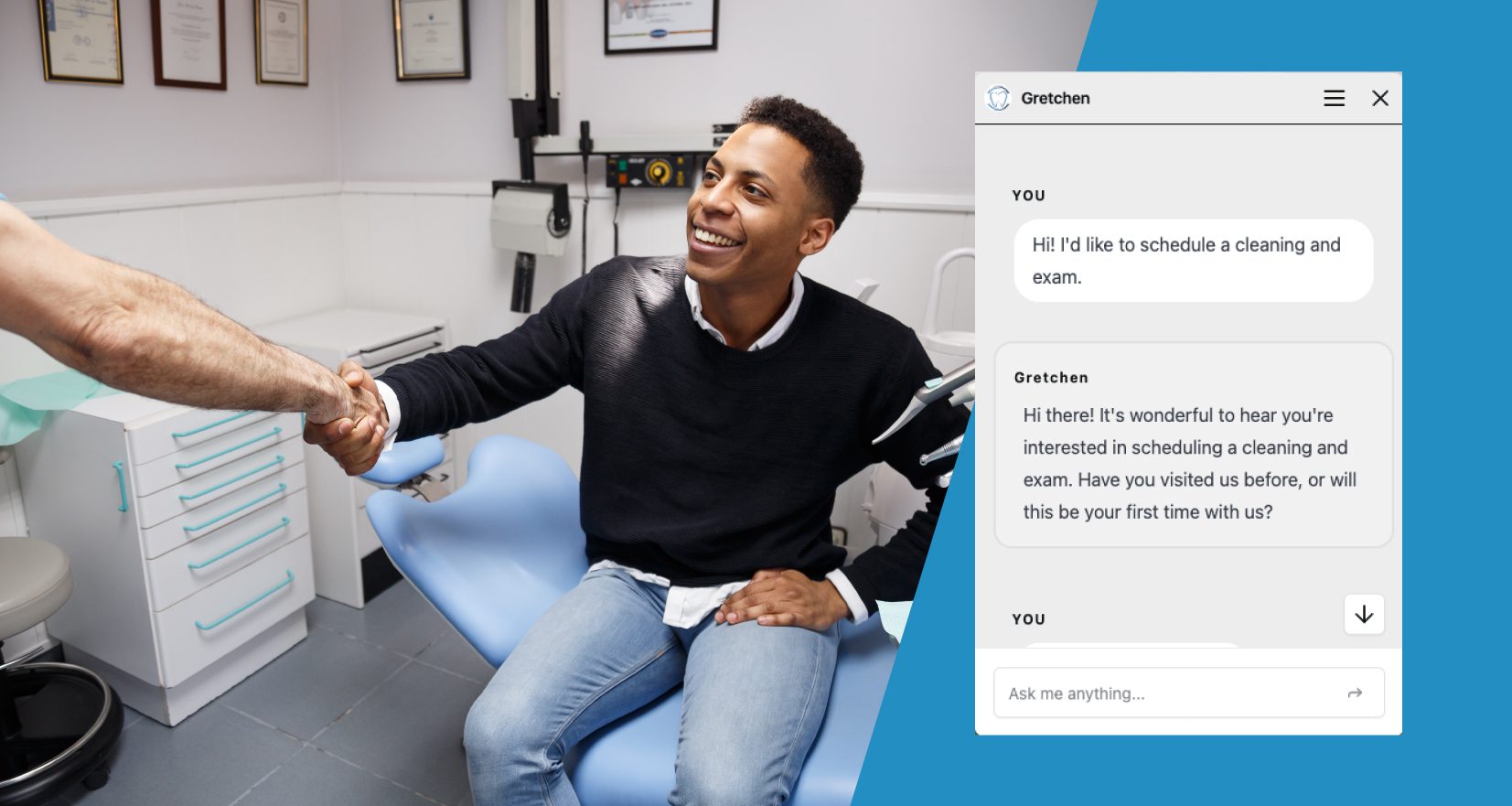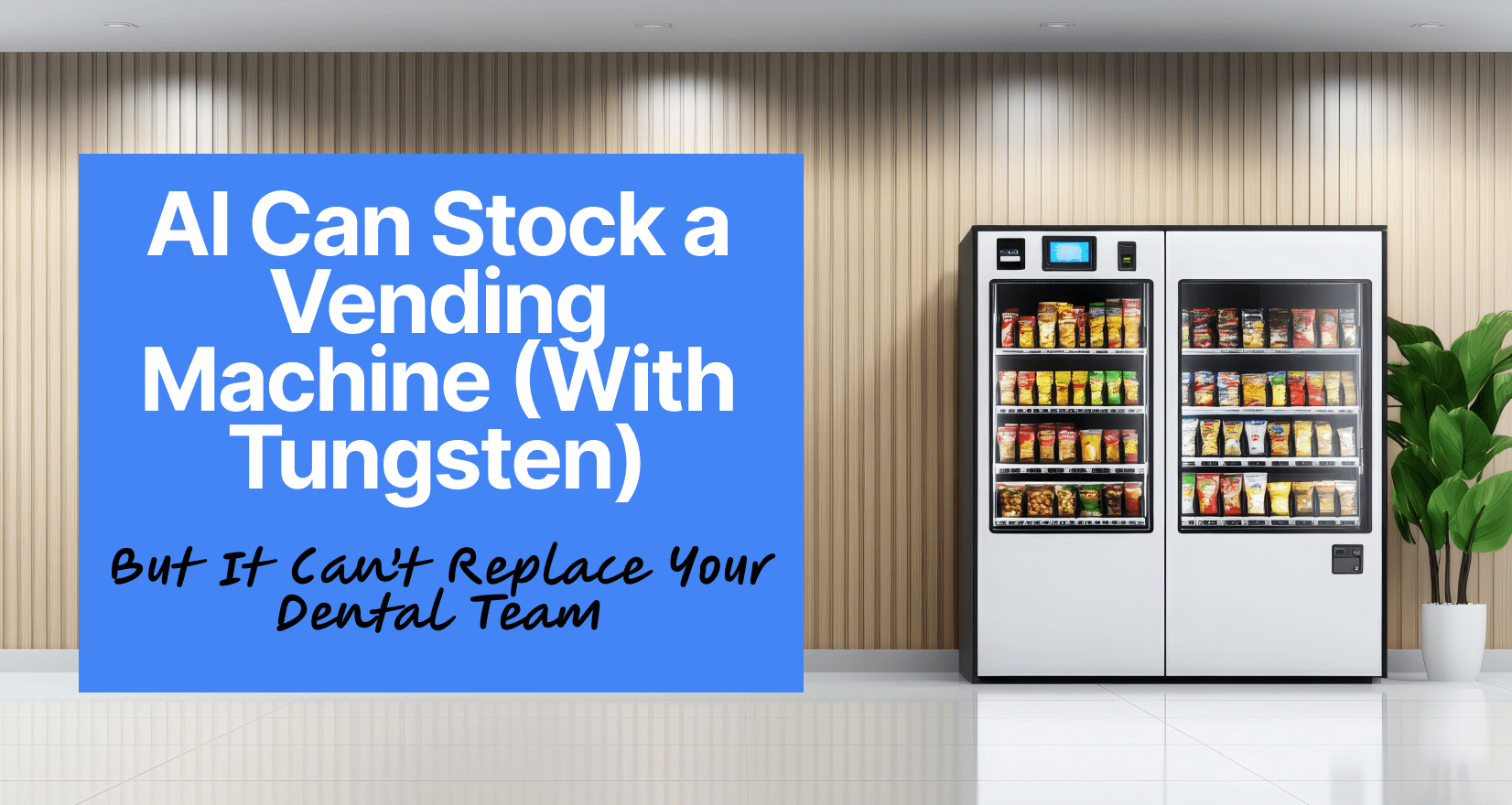
Utilizing AI in Dental Care
If you’re a dentist, chances are you’re enjoying a lovely, leisurely, late-morning brunch while reading this article. Maybe you’ve got a massage booked for the afternoon. Perhaps you’ll do some Sudoku between appointments today. You’ll likely knock off early because there won’t be anything left to do at the office, and you’ll likely use that extra time to catch up on the latest dramatic Netflix limited series. After all, you’re not busy—you definitely have the 10 hours to dedicate!
What? Isn’t this description accurate?
Of course not! And despite our clever misdirection, we know that dentists are busy. Patient care is undoubtedly the most impactful aspect of being a dentist, and you could dedicate your whole workday to providing it. Still, we’re not breaking new ground by discussing the other vital tasks necessary for a practice to thrive.
Administration, dental marketing, patient communication, social media management, billing…the “to do” list is endless. Surely, there’s a solution, right?
How Can You Use AI in Dental Care?
We’d love to tell you there’s a simple trick that can give you all the time you need for your dental practice without sacrificing any personal time, but let’s be honest: it can be a struggle to make sure every patient gets enough attention from you, let alone your poor, friendless sudoku puzzle.
We don’t have a magic bullet for making time slow down, but we can explain how artificial intelligence solutions can streamline operations and tasks in your office. Vital (but menial) tasks suck up your mental energy and time. Still, new technological advances will allow you to use AI in dental care to free up space to do what you do best: build meaningful relationships by providing the attention and care each patient deserves.
Let’s take a look at five areas where AI technology can change everything in dentistry for the better.
Implementing Generative AI Web Chat
Current web chat systems in dental practices are often outdated and inefficient, failing to provide the immediate, on-demand support patients expect. However, recent advancements in generative AI and have revolutionized web chat capabilities. These AI agents can manage web chats with remarkable efficiency, offering real-time assistance that feels genuinely human.
Today’s AI chat tools, such as Annie AI, are specifically designed for dental practices. They are trained on your practice’s unique processes, procedures, insurance details, and more, enabling them to handle a vast majority of patient inquiries seamlessly. Unlike traditional chatbots that are limited to an “if this, then that” structure generative AI agents manage conversations in a human like natural way reducing the need for manual intervention.
Outdated Chatbots
Annie AI
Statistics show that less than 20% of dental practices have integrated web chat into their websites. One common reason for this low adoption rate is the inability to manage the influx of inquiries. For instance, a dental office manager recently shared that her practice had to remove web chat entirely because they couldn’t keep up with the volume of messages. This decision, however, overlooks the fact that 48% of millennials and Gen Z consumers prefer online communication over phone calls. By implementing generative AI web chat, dental practices can cater to nearly two-thirds of their patient base that favors real-time chat support, enhancing customer satisfaction and retention.
Generative AI’s fine-tuning capabilities allow the AI agent to handle conversations with contextual understanding and professionalism that rivals human interaction. This not only improves patient experience but also ensures that your practice remains accessible and responsive, ultimately driving better patient engagement and satisfaction.
Use an AI Phone Assistant
In addition to web chat, managing phone calls efficiently is crucial for dental practices. Many practices miss out on potential revenue by not handling inbound calls effectively, especially during off-hours or peak times. AI can address this issue through the implementation of an artificial intelligent phone assistant.
AI-Powered Phone Assistance
Similar to generative AI web chat, AI phone assistants utilize large language models and conversational AI to manage phone interactions seamlessly. These AI agents can handle calls during weekends, evenings, and other times when your staff might be unavailable, ensuring that no inquiry goes unanswered.
Research indicates that dental practices miss 30-35% of inbound phone calls, potentially resulting in a loss of $150,000 or more in new revenue annually. Traditional solutions like forwarding calls to voicemail are ineffective, as studies show that 75-80% of consumers do not leave voicemail messages. This not only leads to missed opportunities but also diminishes the quality of customer service.
Listen to a recent phone call with Annie AI and a patient wanting to schedule an appointment.
Implementing an AI phone assistant ensures that every call is answered promptly and professionally. The AI can provide information about services, schedule appointments, and even handle billing inquiries based on the same robust data and conversational capabilities as AI web chat. By reducing missed calls and enhancing customer interaction, AI phone assistants significantly improve your practice’s profitability and operational efficiency.
Dental practices considering this technology will find that AI phone assistants are not only reliable but also cost-effective. As AI technology continues to advance rapidly, these assistants offer capabilities that far exceed what was possible just a year ago, making them an invaluable addition to modern dental practices.
Optimizing Your Website with AI Copywriting Tools
Content is king when it comes to online presence, and AI for dentists offers powerful tools to optimize your website through custom copywriting. Effective content not only attracts visitors but also improves your search engine rankings, making it easier for potential patients to find your practice online.
Use AI Copywriting Tools: ChatGPT, Perplexity, and Google Gemini
Tools like ChatGPT, Perplexity, and Google Gemini are leading the way in AI-powered copywriting. These tools can generate high-quality, relevant content quickly and affordably, addressing the common challenge dental practices face in maintaining an up-to-date and engaging website.
Benefits of AI-Driven Copywriting
- Speed and Efficiency: AI copywriting tools can produce content at a fraction of the time it would take a human writer, allowing your practice to update service pages, blog posts, and other website content regularly.
- Cost-Effectiveness: Hiring professional copywriters can be expensive, especially for small to mid-sized practices. AI tools offer a budget-friendly alternative without compromising on quality.
- SEO Optimization: These AI tools are designed to create content that is optimized for search engines. By incorporating relevant keywords and adhering to SEO best practices, AI-generated copy can help improve your website’s visibility and ranking on search engines like Google.
By leveraging AI for custom copywriting, your dental practice can maintain a dynamic and optimized online presence, attracting more patients and staying competitive in the digital landscape. To get started with AI copywriting download our AI Prompting Guide.
Leveraging AI-Powered Graphic Design for Social Media
Effective social media marketing is essential for attracting and retaining patients, and visual content plays a pivotal role in this process. Leveraging AI graphic design can revolutionize how you create and manage imagery, particularly for social media platforms.
AI-Enhanced Graphic Design Tools
Tools like MidJourney, Meta AI, and Gemini’s image generator leverage generative AI to produce high-quality images tailored to your practice’s needs. Moreover, integrations with platforms such as Canva and Adobe Photoshop and Illustrator now include AI-powered features that simplify the graphic design process, even for those with limited design skills.
Focus on Social Media Content
Social media is a powerful channel for dental practices to engage with current and potential patients. AI-generated images can be used for creating eye-catching posts, promotional materials, blog post headers, website visuals, and email headers. These tools enable your team to produce professional-grade graphics quickly and efficiently, ensuring that your online presence remains vibrant and appealing.
By utilizing AI-powered graphic design software, your practice can maintain a consistent and attractive visual identity across all digital platforms. This not only enhances brand recognition but also attracts more patients through engaging and visually appealing content. Additionally, AI tools can help you stay ahead of design trends, ensuring that your social media content remains fresh and relevant.
Diagnostic Accuracy and Assistance
One of the most exciting advances made possible by AI in dental care is diagnostic assistance. Programs like Second Opinion by Pearl can offer an added level of assurance by scanning dental X-rays to detect different conditions—even those that are difficult to spot.
Second Opinion and similar tools offer real-time results by instantly analyzing a patient’s radiographs. These programs are trained using an extensive collection of X-ray examples that allow them to compare patient results. Spotting early decay becomes simple when AI identifies the minute signs that might otherwise be difficult to recognize!
The Bottom Line: AI in Dental Care
It’s human nature to find repetitive tasks tedious, but rapid advances in AI technology make it easier for dentists and office staff to accomplish duties quickly and accurately. Your dental practice can offer patients a well-managed, streamlined process from start to finish, including simple scheduling, automated billing, pain-free data management, and more. Accurate diagnostic tools and intuitive treatment planning allow for better patient outcomes for dentists.
These tools can reduce the busy workload of managing a dental office and create more time and mental energy for what really matters: offering compassionate, attentive care to each patient. So, while AI might not provide complete time freedom—you may have to postpone that Netflix binge—you can still be confident that integrating AI in dental care will give your practice the right information and more space to provide an exceptional visit for every patient.
Frequently Asked Questions
How can AI be used in dentistry?
As AI technology continues to evolve at a rapid pace, more applications for AI in dental care arise. Promising dental AI programs can help with many tasks necessary in a dental practice, including:
- Dental imaging
- Office management
- Diagnostic accuracy
- Patient scheduling and communication
- Treatment planning
- Patient records
- Dental Marketing
How is AI transforming dentistry?
Integrating artificial intelligence into dentistry can improve patient outcomes, streamline office management, and free dentists and staff members to provide optimal care. Digital imaging systems incorporating AI offer more accurate diagnostics, while management tools execute tedious, time-consuming tasks.
How is AI used for dental marketing?
AI in dental care extends to advertising and patient acquisition. Artificial intelligence tools can help dentists create content for social media, create SEO-friendly websites, collect and analyze marketing data, and more. Reputable dental marketing companies investing in AI programs can leverage this new technology to help dentists remain competitive online.
What are the benefits of AI in dental marketing?
Artificial intelligence can simplify your dental marketing strategy by analyzing patient and website data, targeting specific audiences, creating marketing content, and automating processes. Using AI can make your marketing more successful and streamline tasks for an efficient campaign that attracts new patients to your dental practice.
About the Author: Megan Nielsen is an SEO strategist and the Grand Overlord of copywriting at My Social Practice. My Social Practice is a dental marketing company that offers a full suite of dental marketing services to thousands of dental practices throughout the United States and Canada.




















